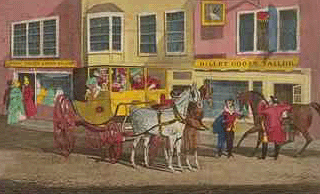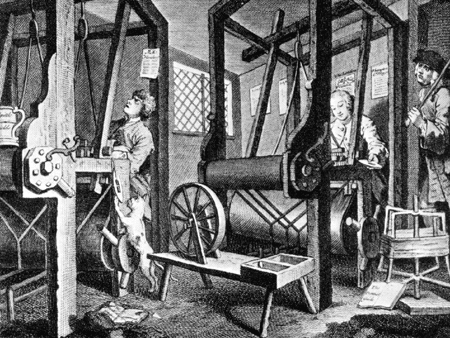The Shopkeeper and His Apprentices
As shop owners and tradesmen, there is a very high standard of quality that is expected of us by Londoners. If you have read Mr. Daniel Defoe's "The Complete Tradesman," you would know that he explains a tradesman 'must never be angry, not so much as seen to be so, if a customer tumbles him £100 worth of goods and scarce bid for anything' {1}. We all abide by this rule. In fact, let me show you this piece from the "London Tradesman" of 1747 that published further qualifications for a successful shopkeeper in the most fashionable districts. I saved it and keep it posted here in the back of my shop:
|
"He ought to speak fluently, though not elegantly, to entertain the ladies; and to be be able to hand a lady to and from her coach politely, without being seized with a palpitation of the heart at the touch of a delicate hand, the sight of a well-turned and much exposed limb, or a handsome face." {2} |
 |
Let me tell you with all honesty, that last part about the handsome ladies and maintaining politeness is really difficult to obey sometimes!
Sometimes owning and running the shop day to day can be tough on the shopkeepers, especially in matters of money. Nothing that is sold in shops is standardized or priced, so the cost of each and every item must be argued about and bargained. Even when an agreement is reached, though, there is always the issue of receiving actual payment. As a result, we give credit pretty freely in the shops and all of our customers, save the very poorest, are allowed to run up bills for as long as a year. Most of our customers are good about paying in full, but there have been instances when a customer has thought his own bill was too high and refused to pay, such as the case with a woman named Mrs. Piozzi. She was dissatisfied with my friend Gillow's bill for furnishing her house and knocked £300 off the total amount. There was nothing poor Gill could do about it. {3}
Actually though, Mr. Palmer recently opened a Haberdashery shop on London Bridge where he sells his goods at fixed prices. There is no bargaining allowed because his apprentice has marked each item with a price on a little ticket attached to the product. I, along with the other owners on this street, don't understand why he does not prefer to deal slowly and individually with each of his customers as we do. After all, providing service to the customers is what we stand for in the first place. {4}
 |
With all the hard work that we do and all that is expected of us, it is highly recommended that shopkeepers hire apprentices. There are no laws restricting working conditions, so most owners force their apprentices to do the same work as the older assistants, but they must start earlier. As it is, most shops open by 8 o'clock in the morning and close at 11 o'clock at night. {5} |
Most of us shopkeepers are male, of course. Respectable females are always shoppers, not shopkeepers. Any woman shopkeepers is automatically assumed to be a prostitute, and actually, most women shopkeepers are in fact prostitutes. One other thing -- I'd like to let you in on a little secret about shopkeepers that does not apply to me or Mr. Nicklin: many male shopkeepers at mercers shops, milliners shops, and other shops that outfit ladies are quite effeminate. You can imagine that we are required to know everything about women's clothing, and the possession of this type of knowledge is often a reflection of a man's femininity. {6}
| Background Page | Bibliography | Notes | About The Authors | Link to ECE Homepage |